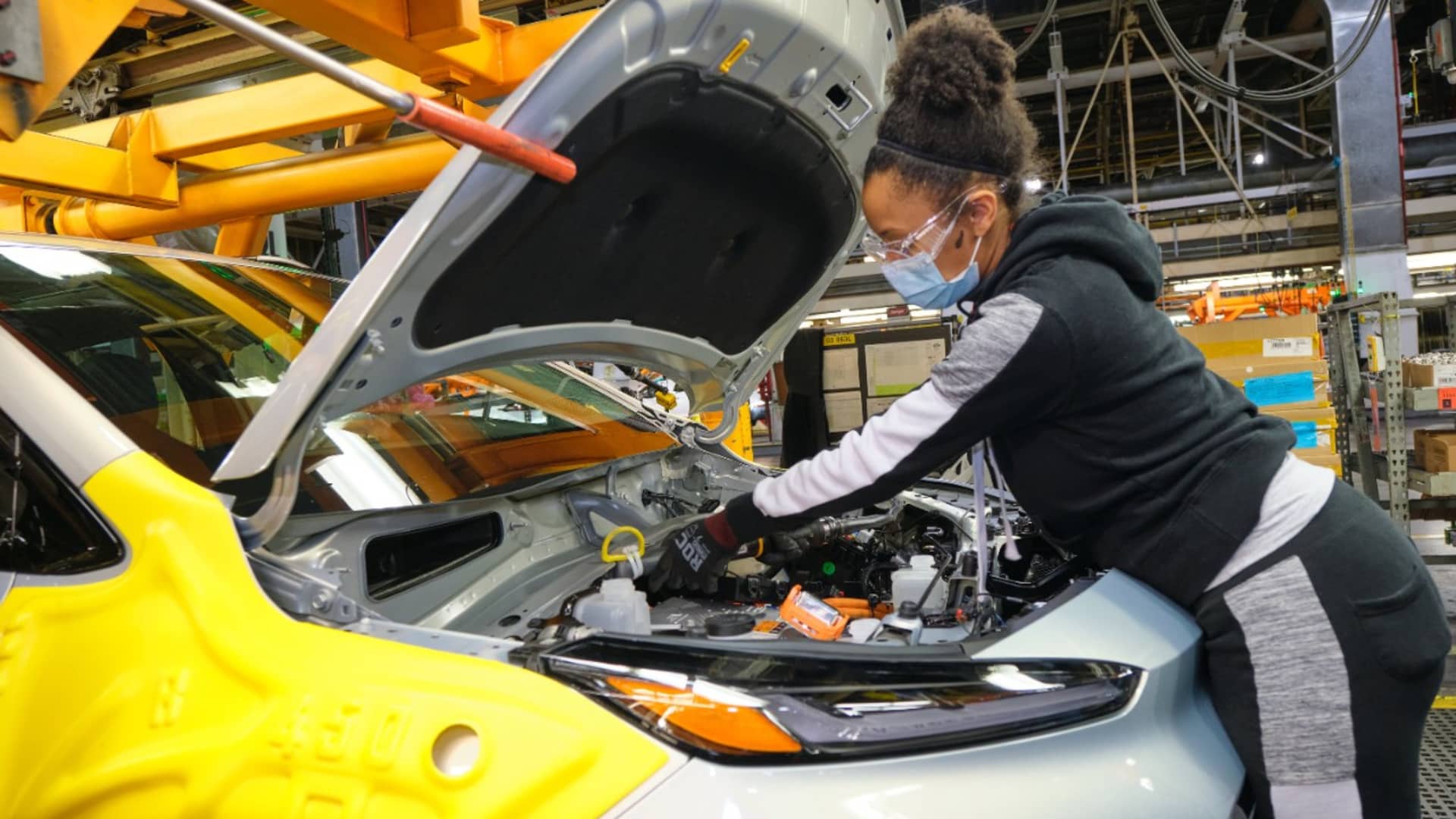United Auto Workers-represented employees at the GM-LG battery plant in Ohio have approved a wage increase agreement, signaling progress in negotiations for better pay and safety standards for electric vehicle workers.
General Motors' joint-venture battery plant in Ohio will provide an immediate pay increase averaging 25% to its workers, along with back pay for hours worked since December.
The United Auto Workers union representing workers at the Big 3 U.S. automakers is demanding a four-day workweek at full-time pay, a 46% wage increase, and a share of company profits, threatening to strike if an agreement is not reached by September 14.
Union workers across industries, including the United Auto Workers, are demanding substantial pay raises of around 50% over four to five years, citing years of stagnant wages and robust company profits, with some unions successfully securing significant wage increases that exceed the expected rate of inflation.
General Motors has made a contract proposal to its hourly workers, offering a 10% increase in wages, among other things, but the offer falls short of the demands of the United Auto Workers (UAW) union, potentially setting the stage for a strike.
United Auto Workers President Shawn Fain stated that the Detroit Three automakers, including Stellantis, Ford, and General Motors, are making progress towards meeting the union's demands as the deadline for current contracts approaches. Stellantis offered a 14.5% wage increase, Ford proposed a cost-of-living wage adjustment, and GM suggested a 10% boost, but the offers still fall short of the UAW's requested 46% increase.
Approximately 146,000 U.S. auto workers are poised to go on strike if General Motors, Ford, and Stellantis fail to meet their demands for substantial pay raises and restored benefits, potentially causing significant disruptions in auto production and impacting the U.S. economy.
The United Auto Workers and the "Big Three" U.S. automakers are negotiating a new labor contract, with the possibility of a strike looming and workers demanding a 20% raise and other benefits, which could potentially impact the Michigan economy and lead to costlier electric vehicles.
The United Auto Workers (UAW) held a limited and targeted strike against General Motors, Ford, and Stellantis over issues including pay, pensions, and work hours, with demands for a 40% wage increase over four years and improvements to retiree benefits; the automakers have offered wage increases of around 14.5% to 20% over the same period, citing investments in electric vehicle production and the need to balance wage increases with costs associated with EV development.
Autoworkers strike as United Autoworkers Union demands 36% pay increase over four years, affecting Michigan, Ohio, and Missouri; President Biden to speak on the matter later today.
The strike by autoworkers against the Big 3 U.S. automakers highlights the growing gap between CEO and worker pay, with the United Auto Workers demanding a 46% raise for workers over the next four years, exceeding the combined 40% increase in CEO compensation over the past four years.
The United Auto Workers (UAW) is demanding that General Motors (GM) give more money to assembly-line workers instead of spending billions on stock buybacks, as the UAW believes that the Detroit Three automakers have been minting profits and should share more with their employees.
The United Auto Workers (UAW) expanded their strike to include additional GM and Stellantis parts distribution centers, adding 5,600 workers and demanding wage increases and an end to tiered-wage scales, while Ford was spared due to progress in talks with the automaker.
Despite the ongoing strike by the United Auto Workers union, General Motors reported a significant increase in third-quarter U.S. new vehicle sales, outpacing industry expectations, but potential sales and supply chain issues may arise if the strike continues or expands.
General Motors estimates that the United Auto Workers strike will cost around $200 million during the third quarter and has filed for additional credit of up to $6 billion in case of ongoing labor troubles.
General Motors has secured a $6 billion line of credit in preparation for additional strikes by the United Auto Workers union, following already incurred costs of $200 million during the third quarter.
General Motors (GM) has made a counteroffer to the United Auto Workers (UAW) in an attempt to resolve the strike against the automaker, while talks between the UAW and Ford have seen progress in key areas such as pay increases.
General Motors has presented a new counter offer to the United Auto Workers amidst the union's announcement of a new strike.
Ford has made a new contract offer to the United Auto Workers union, which includes over 20% pay increases, job security, profit-sharing, and improved benefits such as five weeks of vacation per year.
